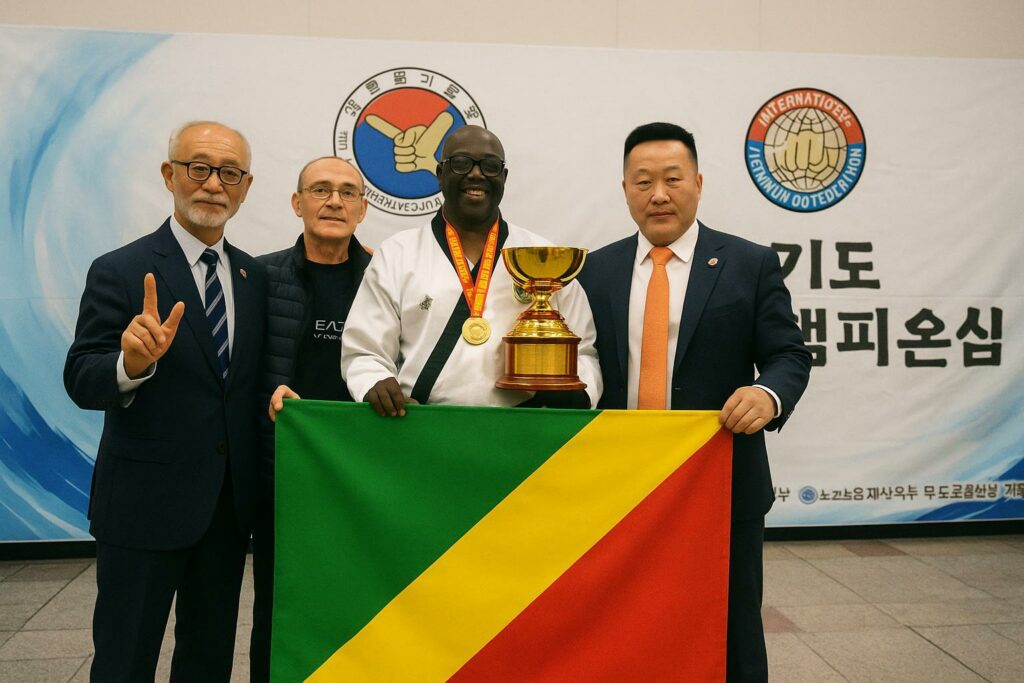Congolese Flag Soars Over Seoul
October’s chilly evening air in Seoul vibrated with applause as the tricolour of the Republic of Congo rose above the podium of the International Hapkido Open. At its base stood Edmond Narcisse Gandsié Dzia, freshly crowned champion in the senior-and-veteran +83 kg division after a flawless series of victories over fifteen opponents representing Asia, Europe and the Americas. The organising committee, relaying the final standings, confirmed the master’s supremacy and praised “a performance of rare tactical intelligence” (World Hapkido Federation communiqué, 27 Oct.).
A Master’s Path Forged in Brazzaville Dojangs
The 43-year-old athlete’s journey began two decades ago on modest tatami mats in Brazzaville, where South-Korean instructors attached to the embassy introduced hapkido to a handful of enthusiasts. Gandsié Dzia’s ascent was rapid: national titles in 2012 and 2015, continental bronze in Yaoundé in 2018, then silver last year in Dakar. His meticulous blend of joint-lock precision and circular kick sequences—hallmarks of the art’s philosophy of non-resistance—caught the eye of Grand Master Kim Jeong-hoon, who invited him to the instructor seminar that preceded the Seoul Open.
Technical Brilliance Meets Diplomatic Courtesy
Observers note that the Congolese fighter’s success was as cerebral as it was athletic. Against Croatia’s Luka Novak in the semi-final, Gandsié Dzia neutralised a high-line strike with a flowing arm bar, transitioning seamlessly into a hip throw that secured ippon in under forty seconds. The final with South-Korean veteran Park Min-su proved sterner. A prolonged clinch ended only when the Congolese master exploited a fleeting imbalance to score with a controlled sword-hand strike to the torso, earning unanimous judges’ approval. “His timing respects the spirit of hapkido—absorbing force to redirect it,” analysed Lim So-yeon, technical director for the Korea Hapkido Federation, interviewed by Yonhap News the following day.
Pleas for Structured State Backing
In the packed auditorium, Gandsié Dzia dedicated his medal to “all Congolese athletes who persevere with limited means,” before urging Brazzaville to scale up logistical and financial assistance. Current annual allocations to minor federations hover around 75 million CFA francs, barely covering domestic competitions. “An incremental boost would allow realistic preparation cycles and ensure the flag is raised abroad more often,” he argued to Radio-Télévision Congolaise. Sports-ministry officials present in Seoul politely acknowledged the request, pointing to the government’s recently announced National Sport Development Plan 2024-2028, which envisions targeted support for disciplines demonstrating medal potential.
Hapkido’s Growing Footprint in Congo
Introduced in the early 2000s, hapkido has gradually moved beyond diplomatic circles. Today twenty-five dojangs operate across Brazzaville, Pointe-Noire and Dolisie, enrolling some 3,400 practitioners according to the Congolese Hapkido Federation’s 2023 census. The art’s emphasis on self-defence resonates with urban youth, while its codified courtesy aligns with cultural values of respect for elders. Educational partnerships signed with lycée principals have integrated weekly sessions into physical-education curricula, a first in Central Africa.
Soft-Power and Economic Ripples
Seoul’s tournament offered more than medals. Delegates from the Korea-Africa Foundation hosted side-meetings on sports diplomacy, highlighting martial arts as a conduit for bilateral exchanges. Tourism analysts already report a spike in online searches linking “Congo” and “hapkido”, suggesting potential niche travel flows. Meanwhile South-Korean equipment manufacturer Hwang Sports signalled interest in opening an assembly unit in Brazzaville’s economic zone, citing reduced customs duties under CEMAC provisions. Such moves dovetail with President Denis Sassou Nguesso’s policy of diversification away from hydrocarbons, reinforcing the narrative that athletic achievement can catalyse investment without antagonising any strategic partner.
Preserving the Essence of the Art
Beyond geopolitical calculations, masters caution against commercialisation overshadowing pedagogy. “Hapkido is first a discipline of character,” reminds Master Gandsié Dzia. For him, the Seoul gold must translate into a nationwide instructor-certification programme, ensuring technical standards keep pace with growing popularity. Plans are already afoot for a continental seminar in Brazzaville next July, under the joint aegis of the African Hapkido Union and the Ministry of Sports, an initiative expected to attract grand masters from Morocco to Madagascar.
The Road Ahead to World Championships 2025
With Seoul’s laurels freshly won, attention turns to the 2025 World Hapkido Championships slated for Busan. Qualification demands successive regional triumphs, travel logistics and sports-science support—areas where stable funding will be decisive. Nonetheless, pundits agree that Gandsié Dzia’s demonstration of controlled power has broadened the horizon for Congolese martial artists. “He showed the world what quiet determination from Central Africa can achieve,” summarised Cameroonian commentator Patrick Biyong on Afrique Sports TV. For aspiring athletes across the Congo, that image of the national flag unfurling in distant Seoul may prove the most compelling incentive to step onto the mat and, with discipline, pursue their own moment of elevation.

